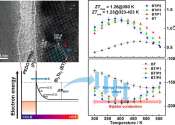Researchers publish theory, formula to improve 'plastic' semiconductors
Anyone who's stuffed a smart phone in their back pocket would appreciate the convenience of electronic devices that could bend. Flexible electronics could spawn new products: clothing wired to cool or heat, reading tablets ...









